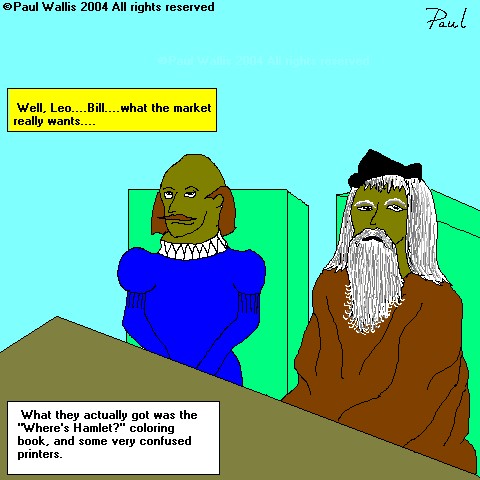How to turn writers into battery chickens

There's a certain mild irony in the fact that with the most advanced communications in history, the art of writing, particularly book writing, has turned into an assembly line process. I actually once saw a book called "10,000 storyline problems for writers", written in 8 point font and over 1000 pages long. A book like this begs the question whether or not a writer is responsible for the condition of their own work.
From the look of modern writing, they're probably not. A large range of concepts of writing techniques infest literature like maggots. There is apparently no place for inspiration, creativity or even consciousness in this process. Everyone and everything, for example, must have a protagonist. If a character goes shopping, the shopping list becomes a protagonist, or a car park or some other vitally necessary literary device.
I grew up reading mainly Voltaire, Aldous Huxley and Isaac Asimov. I also read PG Wodehouse, Jack London, Jerome K. Jerome, George Orwell and many others. One look at any of these writers will tell you at a glance that none of them was even vaguely interested in what is now called rather obscenely "literary form".
Isaac Asimov was particularly helpful in terms of learning how to write basic stories. Asimov may have been one of the great lights of the golden age of science fiction and is now quite rightly revered for his gigantic contribution to both science and literature, but he also wrote at a time when the conditions for writers were nothing less than Spartan. Those were the days of pulp, red pencils were the only colour, and space was limited. Asimov managed to pack more into his early short stories than most writers are now able to do an entire career in writing large numbers of 400 or 500 page books.
There are several reasons for this situation:
- The publishing industry itself is now illiterate. Enormous amounts of cookie cutter garbage are published and consigned to the bargain bins, which are now the compost bins of culture.
- Writing is now being formalized and proceduralized to a point where actual creativity isn't even a consideration. With a Lego set you can have fun, and make your own fun. Writing a book is apparently now supposed to be some sort of hideous ordeal, and from the look of the works on sale, apparently is.
- Academia has stuck its ill-informed, out of date beak into creative writing and has miraculously come up with the idea of "teaching" people how to be creative. The result is fairly similar to a well-intentioned retailer explaining how to paint the Sistine Chapel.
- Media industries now apparently believe qualifications dictate content quality. They don't, and they can't. Those qualifications teach techniques, and while they may be useful in that regard, they are utterly useless in terms of creativity. They don't even appear to teach people to respect their own talents and professional judgment. The "how to" approach inevitably restricts people’s understanding of options and different methodologies. As a way of suffocating creativity in writers, it's excellent. As a method of producing literature, it’s abysmal.
It's a fascinating observation that the conceptual straitjacket of writing techniques has quite literally achieved the battery chicken effect. People trained to do the same thing will do the same thing. An army of anonymous writers comes and goes with each generation. The poor bastards struggle along with that horrifying, almost childish simplicity and dedication which is a virtual guarantee of any creative person walking straight off the nearest available cliff. Dreams of authorship crash and burn on a daily basis.
It is also interesting to think that like McDonald's, if mainstream literature had the best possible products, it could start a new renaissance in a couple of days. McDonald's could be the most effective distributor of high-nutrition value foods on Earth, with a couple of simple changes to product policy. Literary publishing could take advantage of the planet full of people with multiple degrees and start publishing something worth reading with a lot of mental challenges.
Instead of which, we have an industry apparently dedicated to producing hundreds of millions of pages which will never be read, and contain no actual literary values at all. Readers are inflicted with the hideously slow, tortuous process of storyline development in which absolutely no visualization is necessary. This is junk food for the soul, and the sugar is usually the implied naughtiness or glamour of some fictional human Twinkie.
For example, the hero is invariably a middle-aged white male, whose personal presence electrifies everybody. A reputation/character is glued onto this edifice presumably so the reader can identify who is supposed to be who. The minute description of his staggeringly ordinary daily life and takes up a fair percentage of any book. The heroine is invariably glamorous, directly or indirectly with a secret which will appeal to all women in the suburban coma. The storyline will be monotonously explained, qualified, reinforced, reinvigorated and from the look of some of the stories, reincarnated if at all possible. After all, everyone wants a multiple book publishing contract.
This is content? In the literature which everybody recognizes as actual literature, all this filler would have no place at all. Imagine a lengthy description of Romeo’s wardrobe, or a mindless recital of Mr. Pickwick's hairstyle. Tolstoy somehow managed to write War and Peace and leave out the fashion commentaries. Whatever was he thinking?
The supposedly superficial light-hearted writer PG Wodehouse rarely, if ever bothered with much more than basic situational descriptions, because the dialogue and characters were so effective there was no need to waste time and space in his books on things like that. H. E. Bates included the descriptions, but also created an idiom with them, not a laundry list.
"Modern literature" shouldn't really be a contradiction in terms. There are currently about 4000 years worth of good examples of how to write actual literature. What horrifies me is that so many modern "literati" apparently don't even know how to enjoy reading. A sort of infantile seriousness, combined with a total lack of objectivity and utterly predictable obsession with methodologies and forms has taken the place of enjoying a book.
Even reading a phone book like that would reduce the whole concept of reading to a totally sterile, and probably pointless, exercise. Instead of ringing a plumber, there would be an earnest debate about whether or not the Yellow Pages was properly laid out. For all the actual content value, readers might as well be reading a phone book. Literalism, the idea that absolutely everything needs to be spelt out to idiots all the time, has done an excellent job of making literature unreadable and in many cases patronizingly insulting. It’s like going back to kindergarten.
The best description of my type of writing is "intolerant". My first book, the Threat-Hamster Papers, was written as a multilevel book and quite specifically the sort of book I would like to read. I have since written many more in the same vein, and I would be seriously worried if any of my books ever received the sort of "approval from eunuchs" which is apparently a sign of success in modern literature. I don't believe for a second that any literary situation has the right to inflict readers with a sort of recipe where their own participation is marginalized to the point readers are actually irrelevant.
I read recently a description of a work environment as a "plural continuum". That's actually a verbose and quite unnecessary way of describing oneself as awake. Any situation, including literary situations is by definition part of a series of plural continuums. Life doesn't provide intimately detailed character development, mindlessly pedantic storylines, or explanations. People are thrown into life and they simply have to make do with the circumstances and interpret them as best they can.
Why should literature do otherwise? What in the name of God is wrong with people reading a book and interpreting it as they see fit? Literature was once considered a spur to imagination, but now it seems to be deliberately written to prevent any sort of imagination, visualization or even personal engagement on the part of the reader. It's almost as bad as reality television, and equally pointless.
It's hardly surprising that the old classics remain so popular, particularly in an environment where readers can spend large amounts of money simply to be ignored. Even if they do enjoy the books, readers have been inflicted with this quasi-literary barnyard pecking order in which any hack can hide behind literary theory and pretend to understand it. Many of these alleged experts have never written much more than a couple of high school essays, but armed with degrees and the sort of insularity that only a mainstream medium can produce, they honestly believe themselves to be experts.
So the poor readers, innocently enjoying their books, are relegated to implied ignoramuses. In most cases they obviously get a lot more out of the books than those unspeakable professional pedants, but their opinions and ideas are rarely if ever considered.
I look forward to the next generation of battery chicken writers, stumbling around in the theoretical desert, "encouraged" by a collection of vermin. It's so quaint. I may sound unsympathetic, but that's probably because I am. If you're claiming to be a writer, lacking the intelligence and personal integrity to understand how your work is being perverted doesn't exactly support that claim. Going along with the process effectively negates the claim.
Fortunately, this situation won't last forever. Technology is doing a thorough job of destroying the culture that produced this atrocity, and literature will recover and produce great works in future. Battery chickens come and go, too, and good riddance. The rise of a true literary civilization will begin with the total destruction of this insufferable culture.
If you’re a battery chicken publisher, here's a suggested mental
exercise – Pick the best known two word phrase you can think of, and apply it
to yourself. You'll feel much better. Go back to selling used cars, you'll do
less damage to society that way.






